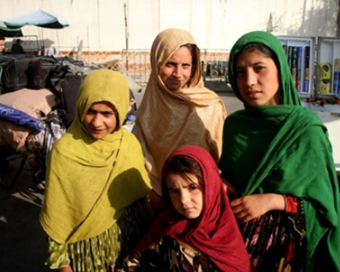Gallery
 PM Modi visit USA
PM Modi visit USA Only the mirror in my washroom and phone gallery see the crazy me : Sara Khan
Only the mirror in my washroom and phone gallery see the crazy me : Sara Khan Karnataka rain fury: Photos of flooded streets, uprooted trees
Karnataka rain fury: Photos of flooded streets, uprooted trees Cannes 2022: Deepika Padukone stuns at the French Riviera in Sabyasachi outfit
Cannes 2022: Deepika Padukone stuns at the French Riviera in Sabyasachi outfit Ranbir Kapoor And Alia Bhatt's Wedding Pics - Sealed With A Kiss
Ranbir Kapoor And Alia Bhatt's Wedding Pics - Sealed With A Kiss Oscars 2022: Every Academy Award Winner
Oscars 2022: Every Academy Award Winner Shane Warne (1969-2022): Australian cricket legend's life in pictures
Shane Warne (1969-2022): Australian cricket legend's life in pictures Photos: What Russia's invasion of Ukraine looks like on the ground
Photos: What Russia's invasion of Ukraine looks like on the ground Lata Mangeshkar (1929-2022): A pictorial tribute to the 'Nightingale of India'
Lata Mangeshkar (1929-2022): A pictorial tribute to the 'Nightingale of India' PM Modi unveils 216-feet tall Statue of Equality in Hyderabad (PHOTOS)
PM Modi unveils 216-feet tall Statue of Equality in Hyderabad (PHOTOS)The Badminton Association of India (BAI) has announced a 14-member-strong India squad for
- Men’s Sr Hockey Nationals to be played in division-based format from April 4
- Mensik denies Djokovic 100th title in Miami final
- KIPG: Son of a vegetable vendor, Bihar’s Jhandu Kumar eyes Worlds, 2028 Paralympics
- Hardik Singh credits hard work and team unity for receiving HI Midfielder of the Year award
- Djokovic, Alcaraz land in same half of Miami draw
Taliban policies turning Afghan women into virtual prisoners in their homes Last Updated : 18 Jan 2022 02:46:40 PM IST 
The Taliban rule has had a devastating impact on Afghan women and girls, according to the Human Rights Watch (HRW) and the Human Rights Institute at San Jose State University (SJSU).
The HRW and the SJSU jointly looked at the conditions for women in Ghazni province following the taliban takeover since last August.The Taliban have banned women and girls from secondary and higher education, and altered curricula to focus more on religious studies. They dictate what women must wear, how they should travel, workplace segregation by sex, and even what kind of cell phones women should have.They enforce these rules through intimidation and inspections.The Taliban have imposed rights-violating policies that have created huge barriers to women's and girls' health and education, curtailed freedom of movement, expression, and association, and deprived many of earned income."Afghan women and girls are facing both the collapse of their rights and dreams and risks to their basic survival," said Halima Kazem-Stojanovic, a core faculty member of SJSU's Human Rights Institute and a scholar on Afghanistan."They are caught between Taliban abuses and actions by the international community that are pushing Afghans further into desperation every day."The HRW and SJSU remotely interviewed 10 women currently or recently in Ghazni province, including those who had worked in education, healthcare, social services, and business, and former students.They described spiraling prices for food staples, transportation, and schoolbooks, coupled with an abrupt and often total income loss.Many had been the sole or primary wage earner for their family, but most lost their employment due to Taliban policies restricting women's access to work.Only those working in primary education or health care were still able to work, and most were not being paid due to the financial crisis."The future looks dark," said one woman who had worked in the government."I had many dreams, wanted to continue studying and working. I was thinking of doing my master's. At the moment, they (the Taliban) don't even allow girls to finish high school."The women said they had acute feelings of insecurity because the Taliban have dismantled the formal police force and the Women's Affairs Ministry, are extorting money and food from communities, and are targeting for intimidation women they see as enemies, such as those who worked for foreign organisations and the previous Afghan government.Most interviewees cited serious mental health consequences since the Taliban takeover, including fear, anxiety, hopelessness, insomnia, and a deep sense of loss and helplessness."The crisis for women and girls in Afghanistan is escalating with no end in sight," said Heather Barr, associate women's rights director at the HRW." Taliban policies have rapidly turned many women and girls into virtual prisoners in their homes, depriving the country of one of its most precious resources, the skills and talents of the female half of the population."IANS New Delhi For Latest Updates Please-
Join us on
Follow us on








172.31.16.186







